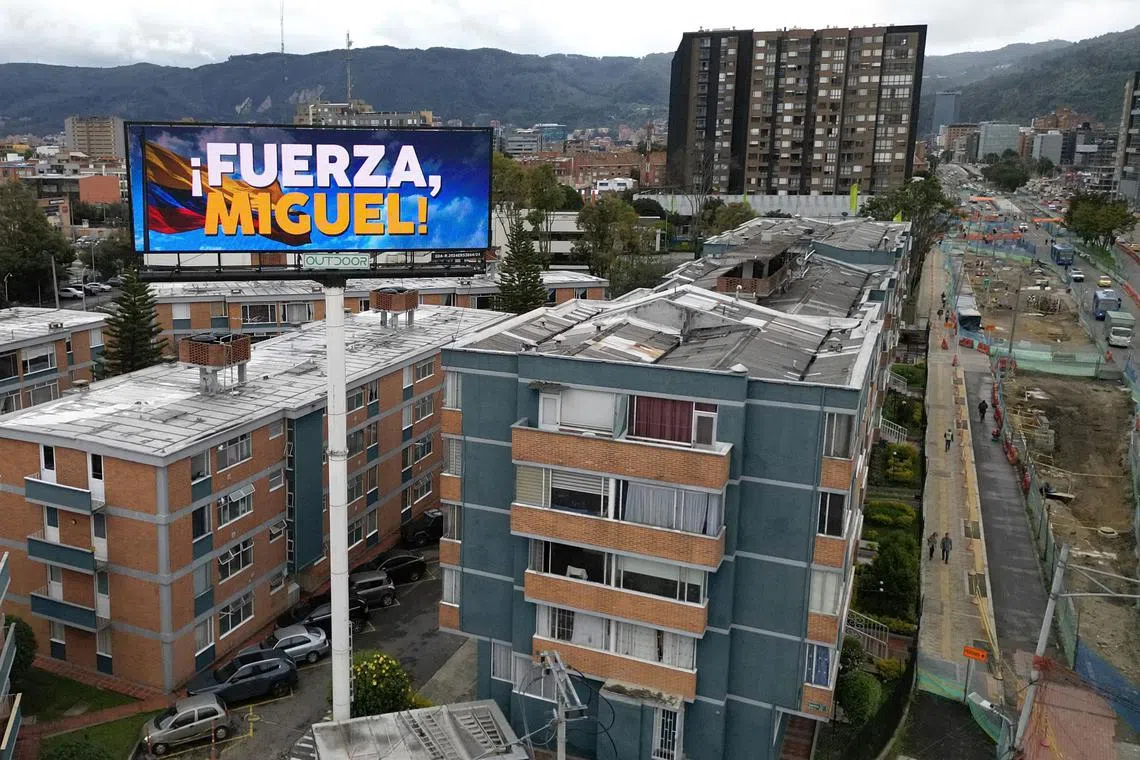Teen hitmen plague Colombia decades after drug lord Escobar hired kids to kill
Sign up now: Get ST's newsletters delivered to your inbox

A billboard in Bogota reading, “Strength, Miguel” in support of Colombian presidential hopeful Miguel Uribe. A teen was arrested for allegedly shooting him in the city in June.
PHOTO: AFP
Follow topic:
BOGOTA – Decades after drug lord Pablo Escobar notoriously built a small army of child hitmen to murder police officers, judges and politicians, Colombia is still plagued by the scourge of teenage assassins.
Last week, a 15-year-old was arrested for allegedly shooting presidential hopeful Miguel Uribe
The Colombian government believes the boy was a hired gun but has yet to determine who ordered the hit on the 39-year-old senator, whose condition remains critical.
The youngster has offered to “collaborate” with the authorities and claimed to have received his orders from a person in the “olla”, as drug-dealing neighbourhoods are known.
The use of children to commit such acts “is not something exceptional for Colombia”, Mr Mathew Charles, director of the Mi Historia foundation for vulnerable youth, told AFP.
Now, as at the time of Escobar, kids from poor, often troubled homes in violent regions are lured into the criminal underworld with promises of money and glory.
“They are looking for quick solutions because there is no food on the table in their homes at night,” said Mr Charles.
‘Deceived’
Criminal gangs – whether they be drug cartels, guerrilla forces or other armed groups – use children because they can be easily manipulated.
A report by the UN children’s agency Unicef and the Colombian Institute of Family Welfare (ICBF) found around 530 minors were recruited by organised crime groups between 2020 and 2022 for a variety of jobs, including as lookouts, couriers or even fighters.
On average, they were between 13 years old and 14 years old, and the majority were from low-income, rural areas in regions plagued by armed conflict.
Between January and June 2024, 142 minors were recruited, according to a different report from the ONCA agency that monitors the impact of armed conflict on children in Colombia.
According to Mr Charles’ research, criminal groups offer to pay young hitmen between US$50 (S$64) and US$500 per victim – a small fortune for someone with limited education and employment opportunities.
However, many are “deceived” and never get their money, he said.
About a third of Colombians live in poverty, according to official figures.
In some cases, armed groups convince children to do their bidding under the influence of psychoactive drugs, said ICBF director Astrid Caceres.
In 2024 alone, about 5,000 children aged 14 to 17 entered the criminal justice system in Colombia, according to the justice ministry – though it did not provide a breakdown of the nature of their crimes.
‘Old custom’
Turning minors into hitmen “is an old custom” that “takes advantage of their marginalised situation”, criminal lawyer Francisco Bernate told AFP.
Generally, people under 18 are not considered fully capable of understanding the consequences of their actions, he added, citing developmental science.
As a result, minors in Colombia can be sentenced to no more than eight years in confinement, compared to 50 years for an adult.
Children do not go to jail, but rather to specialised centres where they undergo rehabilitation and training, said Colombian Attorney-General Luz Adriana Camargo.
The alleged shooter in the Uribe case has been placed in witness protection with his family while the investigation unfolds.
The assassination attempt has brought back bad memories of the days of Escobar, under whose reign of terror four presidential candidates were assassinated in the 1980s and 1990s.
In March 1990, leftist presidential candidate Bernardo Jaramillo was shot at point-blank range as he was about to board a plane with his partner for a Caribbean holiday.
His shooter was 16.
“That young man was detained for just over a year... and in 1992, he was found shot to death along with his father in the trunk of a car in Medellin,” journalist Jorge Cardona told AFP.
Mr Cardona authored a book, Dias De Memoria, about the violent events that marked Colombia from 1986 to 1991.
In 1984, another 16-year-old assassinated then justice minister Rodrigo Lara Bonilla on the orders of Escobar, himself shot dead by the police in 1993. AFP

